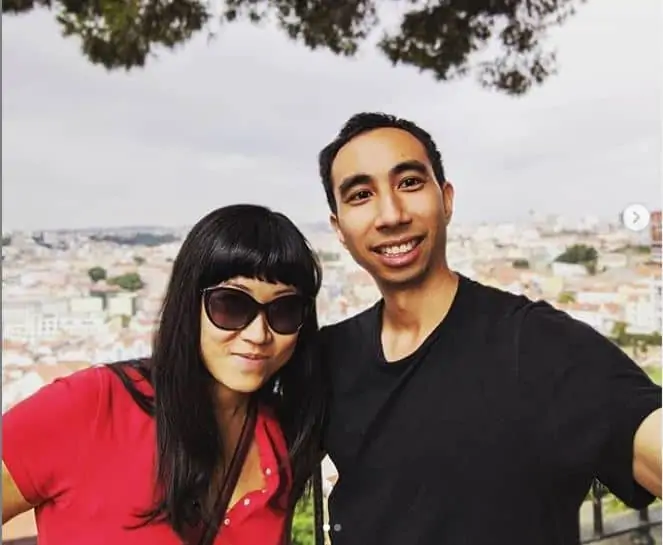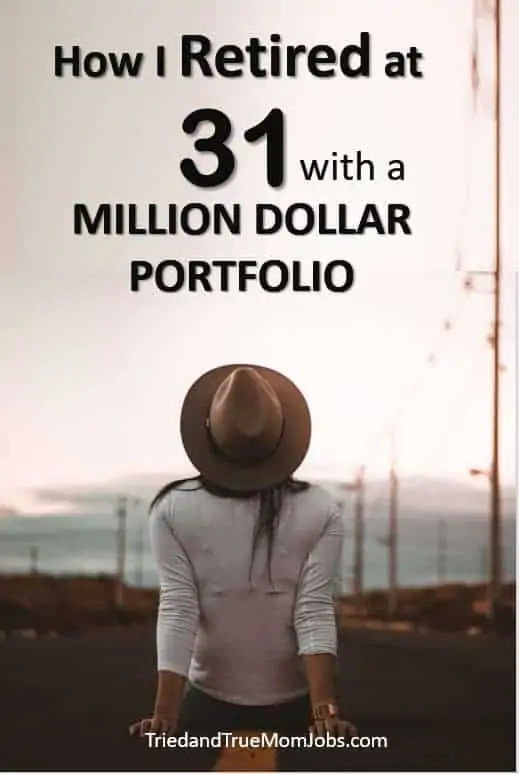How this Couple Retired in their Early 30’s
Do you want to work well into your 60’s before you can retire? I’m sure your answer is no, but how do you get around that? Kristy also known as “FIRECracker” shows us how.
I am so excited about this interview as Kristy is the reason I have become OBSESSED with achieving financial freedom.
While watching the news there was a clip of Kristy talking about how homeownership is a terrible idea and why you should rent instead. The video went viral and it intrigued me to look into this new way of thinking.
I found the Millennial Revolution that she and her husband started and was completely drawn in on how they retired in their early 30’s and how I could too.
I couldn’t wait to share her story with you all, and she did not hold back:
1. Tell us a little bit about yourself. When did you retire and how?
Hi, I’m Kristy (aka “FIRECracker”) from the www.millennial-revolution.com blog. I’m a world-traveler, author, and blogger, and I retired at the age of 31 by building a million dollar portfolio with my husband, Bryce. See the full detail on how I set up my portfolio here.
2. What made you want to retire early?
A stressful IT job that almost killed my co-worker, when he collapsed and almost died at his desk. My boss also had a blood clot in his leg and pretty much everyone I knew on my team (including myself) was on anti-depressants and anxiety meds.
And the kicker? There were also layoffs going on at this time, despite the fact that the company reported 2 Billion dollars in profit that year. I realized that following the conventional path of buying a house, working until we’re 65 and retiring with a pension was no longer feasible. Dying at our jobs for a paycheck wasn’t worth it. I was sick of my corporate prison and I wanted out.
3. How did you decide how much you needed to retire?
By using the 4% rule. We figured since our yearly expenses in Toronto were around 30-40K/year, we’d need 40K * 25 = 1 Million to retire.
4. Did you have to give up anything to accomplish this?
The traditional belief is that you absolutely need to own a car and a house. By using car sharing services, public transportation, walking, and biking, we easily saved 10-15K/year. And by not buying a house and having to hemorrhage money from home ownership costs and mortgage payments, we rented the upper part of a townhouse for only $850/month and put all the money we saved into our portfolio.
We ruthlessly prioritize our spending by putting money towards things that we valued (experiences like traveling—we’d happily spend $5000-6000 on vacations each year) and cut on things we didn’t care about (eating out, going to bars, shopping, etc).
5. How are you living now? Do you still earn an income?
Once we started traveling the world, we realized it’s less expensive to be nomadic than to live in Toronto, where we used to live. In fact, by balancing expensive places like UK, Denmark, Switzerland, with inexpensive places like Southeast Asia, South/Central America, Mexico, Portugal, and Eastern Europe, we found it very easy and comfortable to live on 40K per year.
To give you an example, our brand new condo with pool, sauna, and gym in Chiang Mai Thailand only cost us $575/month. And since this is the 4% our portfolio is generating we realized we could do this forever.
Here’s an article we wrote about how we managed to travel the world on 40K/year
6. What advice would you give to someone that doesn’t make a six-figure income and wants to retire early?
We actually have many readers who write into the blog, and we’ve shown them via our “Reader Case” series that you don’t need a 6-figure income to retire early (some of them even have kids!):
GOT STUDENT LOANS AND DON’T HAVE A 6-FIGURE SALARY. CAN I STILL RETIRE EARLY?
RETIRING EARLY WITH 4 KIDS AND A POSTAL WORKER’S SALARY?
I HAVE 2 KIDS AND ONLY SPEND $48,000/YEAR. WHEN CAN I RETIRE?
Here’s another reader who is 10-15 years from retirement, who earns 30K as an English teacher in South Korea:
HOW TO BECOME FINANCIALLY INDEPENDENT BY TRAVELLING
The key is your expenses. If you don’t earn a 6-figure income, but your expenses are low (like the reader in South Korea I mention above), you can retire faster than someone who earns way more but has much higher expenses. It can be largely dependent on where you live and what your living expenses are.
Another point I make a lot on the blog is that it isn’t about retirement. It’s more about financial independence. FIRE stands for Financial Independence Retire Early. But the RE part is optional, the FI part is mandatory.
Many retirees choose to work after they’ve reached financial independence (for example, we are currently writing a book with Penguin Random House) because we want to, not because we have to. The key difference is you CHOOSE to work, but are not FORCED to work because of the paycheck.
If you work on your passion in retirement (eg, your side hustle is freelance writing for example) and manage to pull in just 20K/year, you can reduce the portfolio you need by 20K*25= 500K/year!
So if your expenses are 40K/year, but you make 20K/year from freelance writing, you can quit your 9 to 5 when your portfolio reaches $500K because your portfolio is financing 50% of your expenses and your side gig is financing the other 50%.
It’s all about freedom and flexibility, not just about retirement.
7. How much money do you make and spend annually (if you don’t mind me asking)?
We withdraw around $36-40K/year from our portfolio and make around $15-20K/year from some side projects we do for fun in retirement (coding, blogging, book writing, etc). We keep the income we make in retirement in a separate portfolio so that our readers can see that our day-to-day living expenses are coming from our original portfolio. We describe this in detail in this post: https://www.millennial-revolution.com/freedom/unexpected-income-are-we-un-retiring/
8. What do you do about Health Insurance?
Great question (funny, it’s always Americans who ask this question). During our first year of travel, we used travel insurance from World Nomads. It cost us around $1500 for the year to cover the 2 of us. When Bryce had a family emergency and we had to fly back they paid for our expenses.
I wrote about the experience here. However, you need insurance from your home country in order for travel insurance to cover you. So now that we’re nomadic, we buy Expat health insurance from IMG, which costs around the same as the travel insurance and covers up to $1 Million for each person in medical expenses.
9. Most of my readers are moms, so when it comes to saving for our kids’ college education what would you recommend we do?
We don’t have kids (yet), but if we end up having kids, we’ll be maxing out their RESP accounts (it’s a tax-sheltered educational savings plan, where the Canadian government contributes 20% matching up to $500/year).
Any educational expenses beyond these costs, I would expect my (future) child to work, get scholarships, etc, to pay for it. The reason for this is because I attribute working during my university education to be one of the best life lessons I ever learned. By working and going to school, not only did I gain experience, I was able to graduate with no student debt.
However, since RESPs are only available for Canadians, here are my friends Jeremy (who blogs at gocurrycracker.com) and Justin (rootofgood.com)’s American approaches to saving for their kids’ education:
https://www.gocurrycracker.com/why-gccjr-has-no-529/
https://rootofgood.com/pay-for-college-while-retired-early/
10. I know you get tons of reader case studies, any advice on things we should just stop doing or start doing to get to financial freedom?
There’s a phrase we say a lot on the blog: MathingS***Up! When you’re making financial decisions, don’t just feel it out. Do the math. You’ll see that just because you don’t have a 6-figure salary, doesn’t mean you can’t become financially independent. Kids aren’t as expensive as people make them out to be when you actually break down the costs and prioritize needs over wants (ie. to spend more time with you, not fancy things). And just because everyone tells you a house is a good investment, doesn’t mean it is.
For the vast majority of our readers who write in, by simplifying and breaking down their situation, most of them can achieve financial independence within 10-15 years. It just takes a lot of prioritizing and MathingS***Up.
11. Any last thoughts you’d like to add?
If you understand money, life is incredibly easy. If you don’t, it’s incredibly hard. That’s why we advocate MathingS***Up before making every financial decision and never spending money based on “feelings”.
Thank you Firecracker for the interview and inspiration to achieve financial freedom.
We are all at different stages of our lives financially, so let’s analyze our current situation and decide what works best. To calculate how you can retire early see how you can do it here.
You Might Also Like
17 Ways to Make Money from Home
Top 10 Ways To Save Money that you May Have Never Considered
How to Make $40,000/yr doing Nothing?

